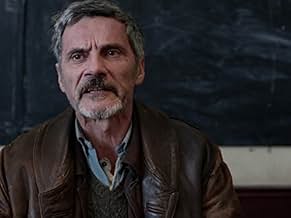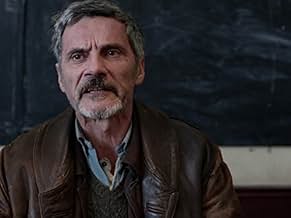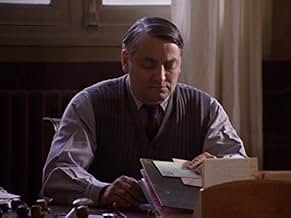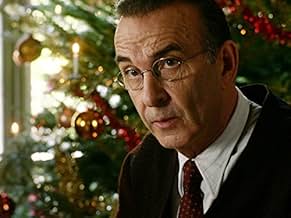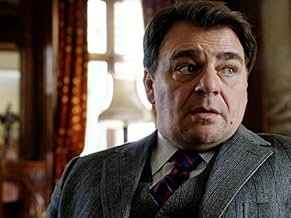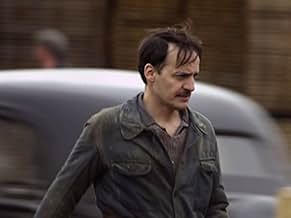Un village français et ses habitants traversent les hauts et les bas de l'occupation de l'armée allemande de 1940 à 1945. Le médecin du village est nommé maire et confronté aux défis, dilemm... Tout lireUn village français et ses habitants traversent les hauts et les bas de l'occupation de l'armée allemande de 1940 à 1945. Le médecin du village est nommé maire et confronté aux défis, dilemmes et demandes et situations contradictoires.Un village français et ses habitants traversent les hauts et les bas de l'occupation de l'armée allemande de 1940 à 1945. Le médecin du village est nommé maire et confronté aux défis, dilemmes et demandes et situations contradictoires.
- Prix
- 2 victoires et 10 nominations au total
Parcourir les épisodes
Avis en vedette
This series is one of the best I've ever seen, the acting, the setting, and all of the historical details done so extremely well. It truly is a shame that this series does not have broader coverage here in the U.S., it would be an excellent choice for airing on HBO. The broad history behind this series is true, the experiences and brutal choices that have to be made by a population under occupation; and it makes one think "How would I cope under the same circumstances?" In watching each episode, I can't wait to see the next one. The cast of characters with different perspectives and story lines blends together flawlessly, and you end up caring about all of them. Truly well done.
Having watched all 65 episodes (seven seasons), I'm overwhelmed by how the scriptwriters not only confronted French viewers with all the gray areas involving their parents or grandparents' collaboration with the Nazis during the time of the Vichy government but also created such complex characters that we sometimes find ourselves booing and hissing the alleged "good guys" and cheering some characters who have behaved in an abominable fashion. But then, the "good guys" can turn out to be more evil than we supposed, and some "bad guys" can readily accept responsibility for all their actions, no matter how monstrous. Some of the most corrupt characters are also the most pragmatic survivors.
Those who stick with the series until the end had better get their hankies ready for the final, completely heart-wrenching two episodes.
The actors are uniformly exceptional in this ensemble cast of hundreds. Most of all, I will never forget Nicolas Gob as Jean Marchetti, a French cop who obeys every command involving the rounding up of Jews or Communists for execution and deportation until he falls for a Jewish woman, Rita (Axel Maricq). But by then, he has acquired the nickname, "Butcher of Villeneuve."
Then there are Robin Renucci and Audrey Fleurot as Dr. Daniel and Hortense Larcher. Dr. Larcher finds himself unwillingly thrust into the position of town mayor whose scruples are compromised one by one until he finds himself compiling death lists with another official, Servier (Cyril Couton), to quench the Nazi thirst for blood in retaliation for Resistance violence done to them, an action that will later have dire repercussions for both men. As for Hortense Larcher, she finds herself attracted to a Nazi leader, Heinrich Muller (Richard Sammel) and is ready to forgive his every sadistic cruelty.
Then there's Lucienne (Marie Kremer), a schoolteacher who falls for a handsome German soldier, Kurt (Samuel Theis) but when he's about to be transferred to the Russian front and she finds herself pregnant, she agrees to marry the headmaster, Bériot (François Loriquet), who is willing to adopt her child as his own.
Finally, there are the major Resistance fighters: Larcher's brother, Marcel (Fabrizio Rongione) and his mistress, Suzanne (Constance Dollé); and Marie (Nade Dieu), a farmer's wife, who is involved with the married owner of a sawmill, Raymond Schwartz (Thierry Godard), who initially is apolitical and gladly sells his product to the Nazis, but ultimately joins the Resistance. Then there's the young Resistance fighter Antoine (Martin Loizillon), who shamefully is forced to leave four buddies behind to be slaughtered by Nazi troops. Finally, there is Schwartz's wife, Jeannine (Emmanuelle Bach) who is determined to survive and prosper, no matter who rules the country.
For me, this is the finest, most engrossing series I've seen since the Spanish "Gran Hotel."
Those who stick with the series until the end had better get their hankies ready for the final, completely heart-wrenching two episodes.
The actors are uniformly exceptional in this ensemble cast of hundreds. Most of all, I will never forget Nicolas Gob as Jean Marchetti, a French cop who obeys every command involving the rounding up of Jews or Communists for execution and deportation until he falls for a Jewish woman, Rita (Axel Maricq). But by then, he has acquired the nickname, "Butcher of Villeneuve."
Then there are Robin Renucci and Audrey Fleurot as Dr. Daniel and Hortense Larcher. Dr. Larcher finds himself unwillingly thrust into the position of town mayor whose scruples are compromised one by one until he finds himself compiling death lists with another official, Servier (Cyril Couton), to quench the Nazi thirst for blood in retaliation for Resistance violence done to them, an action that will later have dire repercussions for both men. As for Hortense Larcher, she finds herself attracted to a Nazi leader, Heinrich Muller (Richard Sammel) and is ready to forgive his every sadistic cruelty.
Then there's Lucienne (Marie Kremer), a schoolteacher who falls for a handsome German soldier, Kurt (Samuel Theis) but when he's about to be transferred to the Russian front and she finds herself pregnant, she agrees to marry the headmaster, Bériot (François Loriquet), who is willing to adopt her child as his own.
Finally, there are the major Resistance fighters: Larcher's brother, Marcel (Fabrizio Rongione) and his mistress, Suzanne (Constance Dollé); and Marie (Nade Dieu), a farmer's wife, who is involved with the married owner of a sawmill, Raymond Schwartz (Thierry Godard), who initially is apolitical and gladly sells his product to the Nazis, but ultimately joins the Resistance. Then there's the young Resistance fighter Antoine (Martin Loizillon), who shamefully is forced to leave four buddies behind to be slaughtered by Nazi troops. Finally, there is Schwartz's wife, Jeannine (Emmanuelle Bach) who is determined to survive and prosper, no matter who rules the country.
For me, this is the finest, most engrossing series I've seen since the Spanish "Gran Hotel."
Fantastic series. It makes the war real, very concrete: not the battles, which we have seen before, but the struggles of ordinary people, trying to understand what's happening, and what that means for their convictions, their acts, who they are. They're slowly adjusting. We all ask ourselves what we would have done, but we forget about "time". Dealing with and understanding the occupation and atrocities took time. It's hard to understand now how people could be horrible, but it was hard then too. The war is hard, what happens to adults horrible. But, I have to say that the part about the Jewish children is unbearable, excruciating. This hits the limits of human understanding. As a mother, I couldn't go through it. Nobody could face this. We all know what happened, and can't accept it, but seeing this so real...
It always sounds really good to take a big, historical event and tell the story through the lens of a handful (or in this case a couple of dozen) characters. It is much harder to execute and more often than not the execution disappoints.
This is the exception. Un Village Francais is a masterful telling of the history of WWII France through the lens of a small village. Those who know their history know that France had a unique history during WWII as they neither remained fully free nor were they entirely occupied by the Nazis.
The show explores all of those dynamics, the naivete of the early German occupation (a reaction that makes sense in the context of a continent whose entire history is built around countries constantly coveting the land of others and seemingly constant wars), the problems that came with the full-on German occupation and the series even lasted long enough to explore the important and timeless themes raised in a post-war France.
The cast is top-notch, the drama is constant and the character arcs over the 7 seasons are almost unbelievable. As war would transform anybody, these characters by the end are almost unrecognizable from how they began.
It is one of the greatest television shows of all time.
This is the exception. Un Village Francais is a masterful telling of the history of WWII France through the lens of a small village. Those who know their history know that France had a unique history during WWII as they neither remained fully free nor were they entirely occupied by the Nazis.
The show explores all of those dynamics, the naivete of the early German occupation (a reaction that makes sense in the context of a continent whose entire history is built around countries constantly coveting the land of others and seemingly constant wars), the problems that came with the full-on German occupation and the series even lasted long enough to explore the important and timeless themes raised in a post-war France.
The cast is top-notch, the drama is constant and the character arcs over the 7 seasons are almost unbelievable. As war would transform anybody, these characters by the end are almost unrecognizable from how they began.
It is one of the greatest television shows of all time.
This is the Most extraordinary show I've ever seen in my 60 year life. The depth and evolution of the characters is flawless. The pain and guilt of the occupation is palpable and touched me in ways I never anticipated. While the show was wrenching at times to watch, I can't imagine a better rendition of such a painful and revelatory experience.
I can't recommend enough!
Postscript: Since finishing the series and writing this review, I've been searching for one word to describe the experience of Un Village Français....The word is haunting...
I can't recommend enough!
Postscript: Since finishing the series and writing this review, I've been searching for one word to describe the experience of Un Village Français....The word is haunting...
Le saviez-vous
- AnecdotesThe town depicted in the series, Villeneuve, is fictional.
- GaffesIn a first-season episode set during 1940, a German soldier is shown wearing the Close Combat Clasp, a decoration which first began to be awarded in November, 1942.
- ConnexionsReferenced in Séries express: Episode #2.30 (2009)
Meilleurs choix
Connectez-vous pour évaluer et surveiller les recommandations personnalisées
Détails
- Date de sortie
- Pays d’origine
- Site officiel
- Langue
- Aussi connu sous le nom de
- A French Village
- sociétés de production
- Consultez plus de crédits d'entreprise sur IMDbPro
- Durée52 minutes
- Couleur
- Rapport de forme
- 1.78 : 1
Contribuer à cette page
Suggérer une modification ou ajouter du contenu manquant

Lacune principale
What is the Brazilian Portuguese language plot outline for Un village français (2009)?
Répondre
![Regarder Bande-annonce Saison 1 [OV]](https://m.media-amazon.com/images/M/MV5BYjJkN2E2M2QtNjgyZS00NTVjLThlYzMtNjBlM2QxZTMxODMwXkEyXkFqcGdeQXRodW1ibmFpbC1pbml0aWFsaXplcg@@._V1_QL75_UX500_CR0)
